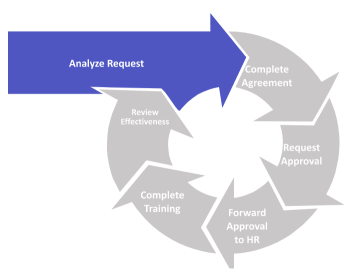Flexible and Adaptive Work Options
In the fall of 2021, Mount Holyoke College piloted a flexible and adaptive work model and the results of the pilot have proven that with remote technologies many positions can be as effective, or more so, at an alternate location such as an employee’s home.
We recognize that for some staff this enables better work-life integration and new opportunities to be more productive in providing student-centered services. This evolution also supports our efforts to attract and retain talent.
Categories of work arrangements
Based on the varying responsibilities and operational needs of departments, we envision staff work arrangements will generally fall into three categories:
- Fully on-campus: These positions require a physical presence on campus to perform their work. This includes positions identified as essential or covered by collective bargaining agreements, faculty, instructors or clinicians.
- Hybrid: Work is conducted from an approved alternative worksite, non-Mount Holyoke location such as an employee’s home for an approved number of days each pay week with the remainder of the work being performed on campus or another Mount Holyoke location.
- Remote: The execution of all an employee’s job responsibilities at an alternate worksite that is not a Mount Holyoke location, such as their home.
Key program elements
Decisions about the suitability of such arrangements are discretionary and require approval from the department head. Remote and hybrid work arrangements will vary by division and/or department.
- Position Suitability: Positions suitable for remote or hybrid work are those in which some or most of the responsibilities can be performed away from the regular work location. The work should involve clearly defined tasks and have well-understood outcomes.
- Employee Suitability: Eligible employees must demonstrate initiative, time management, and organizational skills. They must also be able to complete their required job functions with little supervision.
- Out-of-State Employment: Employment opportunities may be permitted in all of New England as well as the following states: Arkansas, California, Colorado, Florida, Georgia, Iowa, Illinois, Minnesota, North Carolina, New York, Oregon, Pennsylvania, Tennessee and Virginia.
Flexible and remote work philosophy
Mount Holyoke College supports a flexible and adaptive work environment for staff that aligns with our mission, culture and operational goals and requirements as a small, highly-relational residential liberal arts college.
Flexible and adaptive work principles
Flexible and adaptive work decisions will be guided by the following:
Student centricity
Uphold the College’s mission, operating goals and requirements, and align with department needs.
Trust
Trust in staff to fulfill the needs of the department, execute the requirements of their positions successfully, and be accountable for performance standards.
DiversIty
An employer of choice committed to an intentional culture of diversity and a vibrant, highly-relational community.
Operational Excellence
Consistent frameworks for flexible and adaptive work options that enable a distributed workforce to be proactive, efficient, and collaborative.
Infrastructure
Enable flexibility through efficient and effective use of time, technology, communication and other college resources while simultaneously ensuring safety and optimization of service delivery.
Employee Development
Manage the distributed workforce by aligning and developing training, communication, and reliable tools to support staff as we continue to evolve.
Approval process

Requests for any flexible and adaptive work arrangement may be initiated by the employee, department head, or as a condition of employment established by the College. Flexible and adaptive work arrangements are discretionary, typically made by the department in consultation with Human Resources, and such arrangements may be rescinded or changed by the College at its discretion at any time.
Steps in the process:
- The employee’s department head will conduct an analysis of the employee’s position and suitability to determine if a flexible and adaptive work arrangement may be granted.
- Employee submits the request to their department head. The department head completes the Out-of-State Employee Approval form (if work is being performed outside Massachusetts).
- The department head provides written approval or denial. The department head completes the Out-of-State Employee Approval form (if applicable) and gains approval from the division leader and the Vice President for Finance and Administration.
- Forward a copy of the signed agreement and Out-of-State Employee Approval (if applicable) to Human Resources - Employee Relations for approval.
- The employee participates in remote work readiness training.
- The department head conducts an initial review of a flexible and adaptive work arrangement with the employee within three to six months after the arrangement begins and ensures that the arrangement is reviewed with the employee periodically after that, at least annually.